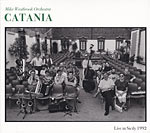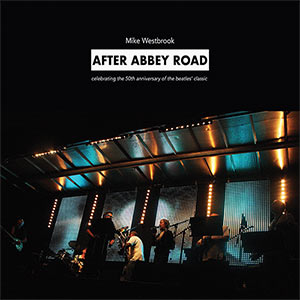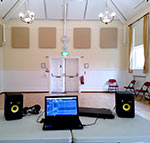Part One The Front Page
1. Freedom’s Crown
(Sonnet for Stephen)
Mike Westbrook/Kate Westbrook
2. Propositions
Mike Westbrook/Kate Westbrook
3. Because
Lennon/McCartney
4. The Triumphant Entry
Mike Westbrook/D.H.Lawrence
(from “the Ass”)
5. A Flower is Lovesome Thing
Billy Strayhorn
Part Two Bar-Room Piano
6. Sophisticated Lady
Duke Ellington
7. Gaudy Bar
Mike Westbrook/Kate Westbrook
8. Solitude
Duke Ellington
Part Three Love Stories
9. Nähe des Geliebten
Mike Westbrook/J.W. von Goethe
10. View From The Drawbridge
Mike Westbrook
11. Tender Love
Mike Westbrook
12. You Make Me Feel Brand New
Thom Bell/Linda Creed
13. A Nightingale Sang in Berkeley Square
Eric Maschwitz/Manning Sherman
14. The Sound of Caress
Mike Westbrook/Kate Westbrook
15. She Loves You
Lennon/McCartney
Part Four The Blues
16. My Lover’s Coat
Mike Westbrook/Kate Westbrook
17. D.T.T.M.
(Danilo Terenzi, Tony Marsh)
Mike Westbrook
18. Good Old Wagon
Bessie Smith
19. Blues For Terenzi
Mike Westbrook
* * *
20. If Thou Must Love Me
Mike Westbrook/Elizabeth Barrett Browning
1. Freedom’s Crown
(Sonnet for Stephen)
Mike Westbrook/Kate Westbrook
2. Propositions
Mike Westbrook/Kate Westbrook
3. Because
Lennon/McCartney
4. The Triumphant Entry
Mike Westbrook/D.H.Lawrence
(from “the Ass”)
5. A Flower is Lovesome Thing
Billy Strayhorn
Part Two Bar-Room Piano
6. Sophisticated Lady
Duke Ellington
7. Gaudy Bar
Mike Westbrook/Kate Westbrook
8. Solitude
Duke Ellington
Part Three Love Stories
9. Nähe des Geliebten
Mike Westbrook/J.W. von Goethe
10. View From The Drawbridge
Mike Westbrook
11. Tender Love
Mike Westbrook
12. You Make Me Feel Brand New
Thom Bell/Linda Creed
13. A Nightingale Sang in Berkeley Square
Eric Maschwitz/Manning Sherman
14. The Sound of Caress
Mike Westbrook/Kate Westbrook
15. She Loves You
Lennon/McCartney
Part Four The Blues
16. My Lover’s Coat
Mike Westbrook/Kate Westbrook
17. D.T.T.M.
(Danilo Terenzi, Tony Marsh)
Mike Westbrook
18. Good Old Wagon
Bessie Smith
19. Blues For Terenzi
Mike Westbrook
* * *
20. If Thou Must Love Me
Mike Westbrook/Elizabeth Barrett Browning
Mike Westbrook - Piano
In concert at 19 rue Paul Fort, 75014 PARIS,
19th and 20th July 2016.
Presented by Helene Aziza
recorded by Jon Hiseman
Programme Note and reviews on the PARIS page.
We'll Always Have Paris - PARIS album sessions
In concert at 19 rue Paul Fort, 75014 PARIS,
19th and 20th July 2016.
Presented by Helene Aziza
recorded by Jon Hiseman
Programme Note and reviews on the PARIS page.
We'll Always Have Paris - PARIS album sessions
Catania - Live in Sicily 1992
Love and Understanding
Selected Recordings
Says The Duke 2022
London Bridge Live in Zűrich 1990
Says The Duke 2020
Band Of Bands
the piano and me
take one
take one
the piano and me
take two
take two
the piano and me
take three
The Birds of Dartmoor
take three
The Birds of Dartmoor
the piano and me
take four
unedited improvisations
take four
unedited improvisations
After Abbey Road
the piano and me
takes one to four
takes one to four
Mike Westbrook Recordings

PARIS
Mike Westbrook - Piano
Mike Westbrook
P A R I S
for Kate
P A R I S
for Kate
Track Listing
Information
In the days leading up to Mike Westbrook’s solo recital at Kings Place on Saturday afternoon, part of the EFG London Jazz Festival, I’d attended a run of performances by several younger pianists — Kit Downes, Michael Wollny, Giovanni Guidi and Jason Moran — of great reputation and achievement. Spending just over an hour listening to Westbrook as he stitched together songs that have meant much to him over the years provided a useful reminder of what age can bring.
Mike Westbrook at the Piano
Westbrook turned 80 this year. Afterwards, in conversation with Philip Clark, he spoke of the way a prolonged examination can change the material: “a deep process”, he called it, and one which he applied with equal success to songs by Duke Ellington (“Sophisticated Lady”) and Thom Bell (“You Make Me Feel Brand New”) and to pieces from his own pen, including some from his works inspired by Blake, Goethe and Lawrence.
“You don’t have too much respect for the material,” he observed. “You use it. You find harmonies that interest you more than the original. You layer one chord on top of another to make it more magical, or more beautiful, or even to throw a spanner in the works. But it’s not random. It’s logical.” The reharmonisation of some of these pieces was striking. “It’s no secret,” Westbrook said, “that when you’re writing arrangements at the piano, you become a master at holding down chords while you reach for a pen to write them down. I’ve developed a piano style almost out of that.”
It’s his version of what used to be called “arranger’s piano”, the spare approach associated with Tadd Dameron and Gil Evans, among others. And you could hear very specifically what he meant when he struck thick, dark chords and allowed them to resonate and bounce off the lid of the 7ft Steinway Model B in the silence between “You Make Me Feel Brand New” and “A Nightingale Sang in Berkeley Square”.
The mood was reflective, sometimes elegiac, particularly when he included a First World War poem in the first of the long, loosely themed sequences into which the recital was divided. Throughout the hour I loved the sense of a man playing these pieces for the thousandth time but still searching for new angles, new shapes, and new combinations of notes with which to deepen his investigation of their wordless essence. There was not a wasted note, not a superfluous gesture, not the tiniest hint of display for its own sake.
Much of the programme reflected the structure of his new solo album, which is titled Paris and was recorded earlier this year in an art gallery and performance space near the Porte d’Orléans. In his online notes to the album (to be found here), he says this while introducing the sequence of pieces grouped under the heading of Bar Room Music: “I often enjoy playing the piano in a crowded room where people are talking. Though almost no one is paying any attention to the music, it nevertheless affects the general atmosphere.”
Those words reinforce his strong sense of the social function of music, made explicit in the past in the work he and his wife Kate have done with street theatre groups and with their brass band. But the Kings Hall recital was at the opposite end of the spectrum: a carefully focused performance in an optimum listening environment, in front of a rapt full house. As always with Westbrook, a massive authority was lightly worn– but its presence was never in doubt, and the result was unforgettable.
Richard Williams The Blue Moment 20th November 2016
order from
Order CD from Westbrook Records
UK ONLY
See below to purchase outside the UK
Other Westbrook CDs are available from
£12 inc UK P/P only
Unfortunately, we are unable to collect the appropriate taxes for purchases outside the UK on this website. To order from outside the UK please use BANDCAMP - click on the link below.
Mike Westbrook













